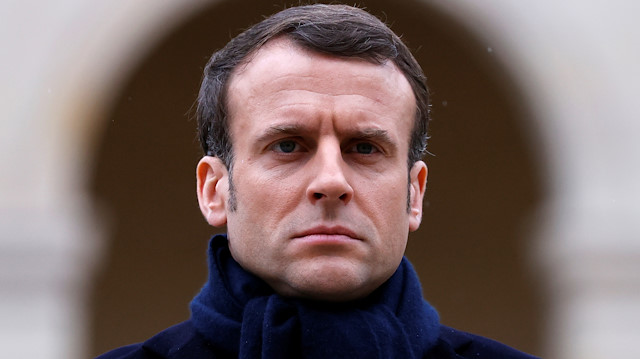
French President Emmanuel Macron’s controversial plan “to combat foreign influences” on Muslims sparked criticism with some community figures describing his policies Islamophobic.
In a speech last week in Bourtzwiller, a district in the eastern French city of Mulhouse, Macron outlined his ideas for an approach which he said would battle "separatism" and "communitarianism", or the proliferation of communities governing themselves apart from the French Republic.
The plan, according to the government, aims to bring those faithful more in line with a French cultural mindset.
Chief among the measures are increased training of imams in France, and the cessation of "detached imams" being let into France to teach Islam in mosques, as well as the allowance of some 300 "chanters" during Ramadan, the Islamic period of spiritual reflection.
An estimated 6 million Muslims are living in France, or 8% of the population. It is the largest Muslim assemblage in any European country.
Macron has consulted the French Council of the Muslim Faith (CFCM), an elected body representing Muslims in France to train imams within the country and in French territories. The need to speak French is inherent in the new measures.
Criticism from Muslim leaders surfaced in light of Macron's remarks, especially from Mohammed Moussaoui, the new president of the council.
"Muslims in France do not want a community ghetto. They want their religious practice to be seen as an element of their individual freedom, rather than a permanent source of public debate."
Pointed comments also came from the head of the Grande Mosque of Paris.
"We don't bring wolves into the sheepfold," said Chems-Eddine Hafiz, the rector. "These imams are controlled. But I understand that solutions have to be found and the Grand Mosque of Paris is working on it."
Ironically, the Mosque had just inaugurated the Al-Ghazali Institute for training in the Yvelines outside of Paris, on Feb. 15, just before Macron's speech, recognizing the need for proper training.
Hafiz understands there has only been "an acceptable solution" until recently to control the detached imams "within the framework of governmental agreements".
Critiques poured in from Muslim voices in other countries as well.
In The New Arab, writer Malia Bouattia wrote: "President Macron has demonstrated once again that in France, inciting hatred or attacking a person's dignity is OK, if the target is Muslim."
U.K. Labor councilor Ali Milani, a parliamentary candidate in last year’s race against Prime Minister Boris Johnson and a practicing Muslim, offered a harsh assessment, especially after the recent shootings in Hanau, Germany.
On Feb. 19, a German far-right extremist attacked two cafes and killed nine people with migrant backgrounds in the western town of Hanau. Four people with Turkish roots died in the racist terror attack, as did one Bosnian, one Bulgarian, one Romanian, and a dual German-Afghan national.
Germany has witnessed growing racism and Islamophobia in recent years, fueled by the propaganda of neo-Nazi groups and the far-right Alternative for Germany (AfD) party. A country of over 80 million people, Germany has the second-largest Muslim population in Western Europe after France. Among the country’s nearly 4.7 million Muslims, 3 million are of Turkish origin.
“I’m done with mincing words. This vicious rise in Islamophobia is aided and abetted by mainstream political leaders. From Macron’s rhetoric to Boris Johnson’s outright racism, they are all guilty,” Milani said.
Macron has acknowledged the need for religious freedom, such as that exercised by the large Muslim population in Mulhouse, but argued for curbing "separatism" as a preventative against the terror attacks that have rocked France over the past six years.
"Islamist separatism is incompatible with freedom and equality, incompatible with the indivisibility of the Republic, and the necessary unity of the nation," he added.
But Mustafa Sentop, Turkey's parliament speaker, saw things quite differently via a tweet.
"The explanations of Mr. Macron, announcing that he will fight against Islamist separatism, is a sign of 'a primitive Islamophobia'," he said, adding: "France should face its racist past, instead of inventing an imaginary enemy like 'Islamist separatism'."
For Macron, assimilation of the Muslim population into the dominant French culture is the point.
"I am not comfortable with the idea of having women and men in the school of the Republic who can teach without the national education system being able to exercise any control," Macron said in his speech Tuesday. "And neither do we have control over the programs they teach. We cannot teach things that are manifestly incompatible either with the laws of the Republic."
The CFCM's Moussaoui understands the need for integration, albeit within a spiritual perspective.
"Muslim religious leaders must play their full part in the framework of their prerogatives. Religious institutions must promote common values, capable of preventing any separation or division in our society."
There are no specifics as to when Macron's measures will be put in place. They are not, he insists, anti-Islam, but those created to afford integration.
Macron's measures -- enacted to restore order in impoverished Paris suburbs like Mulhouse -- are also a gesture to gain support from voters in light of the municipal elections in March.
Those opposed to Macron in the political sphere spared no words in criticizing his new directives.
"The president is trying to divert attention away from his policies," said Communist MP Pierre Dharreville in an interview last week on BFM TV.














